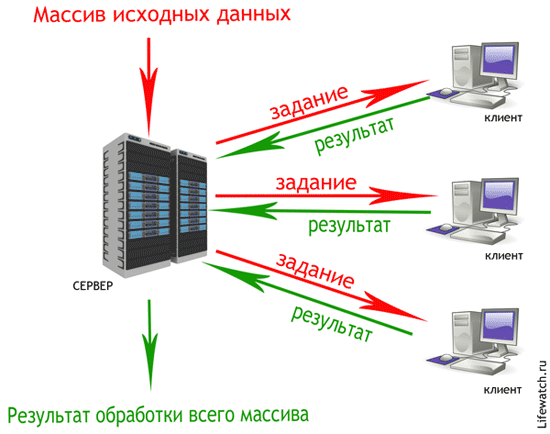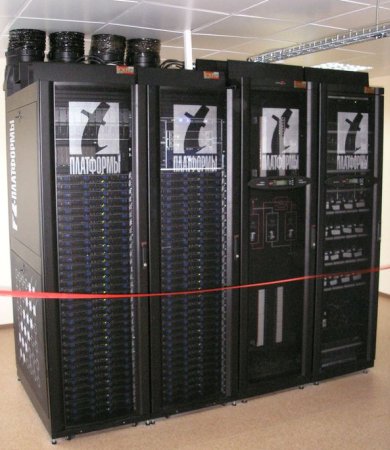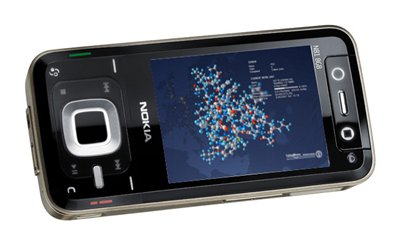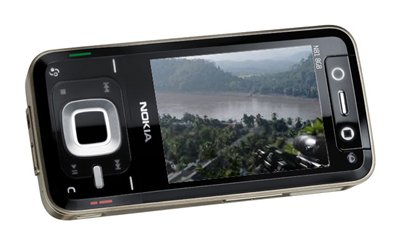Development of a distributed computing system for mobile platforms
Where have you gone
Not so long ago, I graduated from such an entertaining (judging by the time costs for useless activities) institutions like a university. Well, it would seem, graduated, so live and rejoice. Work, pay taxes, in general, be kind, work out what the state has invested in you. That would be all right, but shortly before graduation, I was fascinated by one interesting topic — the topic of distributed computing. After all, this is a direct collective “mind”, “mutual assistance” among the iron fraternity. Funny isn't it ?! Yes, and I want to move the science, as many teeth whine. And not to move, forgive, deep into, as it is now popular (we will look towards domestic nanotechnologies), but rather to pull it into the light, as if pathetic it would not sound. So what is not a topic for a master's thesis?

Only here the topic is quite wide. No, there are enough problems in this area, of course, but most of them have been chewed more than once ... Stop! And if you recall the second obsessive idea that came to me, only a little later - the development for mobile platforms.
')
How is it now
At the moment, in networks of distributed computing, “desktop” machines are used, centralized servers for collecting results and for distributing solved tasks. And why no one pays attention to small and useful gadgets, “living” in the pocket of almost everyone? Yes, they are several times weaker, the ways of transferring data between them are slower, but they are more and require less power.

Yes, for serious, large-scale tasks to use mobile platforms as compute nodes is ridiculous. No, the same “Climate Prediction Production” will hardly interfere with the extra power (although it’s still interesting, you need to issue the task, spending the processor time, you need to transfer, taking some of the bandwidth, with a small return), but it will be so insignificant that sin and neglect.
I want Nile to flow at my feet
It’s another thing if you wanted to process / calculate something far from your stationary machine or laptop. Sit on a couple at the university, wait at the bus stop, relax in a small mountain hut with friends, but in general do it, God knows what, well, it took you to play a powerful toy, process a complex 3D model, calculate the probability of an avalanche, eventually. Problem: truth: power is not enough. But if there are people nearby who are happy owners of a mobile platform, then everything becomes much simpler. Why not borrow unnecessary at the moment the power of a communicator or a smartphone or two? And now you are already “chasing” the ported doom3 on a relatively weak gadget.

Bluetooth 2.0 speeds should be enough to ensure efficient transfer of the original / processed data. And in the case of processing a large array of data, when you only need the end result, you can run the task and go about your business. All the devices encountered on the way that fall within the range of the Bluetooth adept of your device and participate in this project will contribute to the process by allocating processor time. Or you share the power of your device. Here you can also wind up the rating system, as on the same torrents. As it was with Goethe: "He himself becomes richer, who generously donate in the distribution." Why not implement such a thing, only in relation to CPU time?
A little fly in the honey does not hurt
Of course, not everything is so cloudless: you need to take into account that the falling out of end nodes will be much more often, just do not forget about the possibility of the appearance of two “servers” trying to distribute the load and these are only problems that come to mind first, but how many will appear in the implementation process ?! At the same time, what kind of development managed without problems arising in the process of implementation? Hmm ... Apparently I do not know these.
From idea to implementation
At present, a methodology is being developed, and trial ones are being implemented, rather simulations than real-life applications. I started with the most famous Symbian platform, but the whole point is that the system should be cross-plasma. This moment will add the list of problems about which I spoke above. But there are no unsolvable problems, and my technology will definitely be implemented.

So, maybe someday you will be playing the next version of Crysis on your smartphone or you can get enough power to realize a sudden idea even away from desktops and laptops.
Source: https://habr.com/ru/post/92392/
All Articles